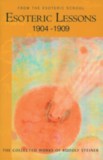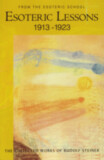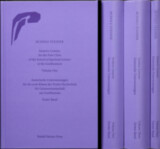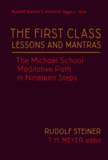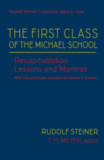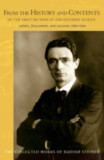Esoteric Lessons 1910–1912
From the Esoteric School 2 (CW 266/2)
Volume vol. 2 (CW 266/2) — From the Esoteric School- Publisher
SteinerBooks - Published
20th April 2012 - ISBN 9780880106177
- Language English
- Pages 520 pp.
- Size 6" x 9"
Notes written from memory by the participants and meditation verses by Rudolf Steiner (CW 266/2)
"Many who enter esoteric training are very disappointed and say that they had imagined the exercises to be much more energetic and the effects of the exercises to be far more drastic. Those who tell this to themselves should quickly consider the possibility that they are caught in a great error, and that they should make the greatest efforts to correct this error as soon as possible. It is not the exercises that lack enough energy, but rather the individual. It is not the exercises that are ineffective, but rather the person who is not making them effective. By living an esoteric life, the student should become an entirely different person. One must add something new to the old." —Rudolf Steiner
In this second of three volumes from Rudolf Steiner’s early Esoteric School, we find a further deepening of spiritual practice and training. Steiner explains the requirements one must meet to become a serious student of esotericism. In addition, he gives directions—always emphasizing the increasing need for earnestness—for the transformation of the inner life, for the development of new spriritual forces and capacities, and for recognizing and overcoming the dangers that arise on a spiritual path. Moreover, he shows how one should approach specific meditations.
These lessons mark Rudolf Steiner’s continued movement away from the Eastern path of the Theosophical Society at the time and his increasing focus on the Christian-Rosicrucian path, recognizing Christ as the leader of the path of his form of spiritual training.
This volume is the English translation of «Aus den Inhalten der esoterischen Stunden, Gedächtnisaufzeichnungen von Teilnehmern. Band.2, 1910-1912» (GA 266/2).
Rudolf Steiner
Rudolf Steiner (b. Rudolf Joseph Lorenz Steiner, 1861–1925) was born in the small village of Kraljevec, Austro-Hungarian Empire (now in Croatia), where he grew up. As a young man, he lived in Weimar and Berlin, where he became a well-published scientific, literary, and philosophical scholar, known especially for his work with Goethe’s scientific writings. Steiner termed his spiritual philosophy anthroposophy, meaning “wisdom of the human being.” As an exceptionally developed seer, he based his work on direct knowledge and perception of spiritual dimensions. He initiated a modern, universal “spiritual science” that is accessible to anyone willing to exercise clear and unbiased thinking. From his spiritual investigations, Steiner provided suggestions for the renewal of numerous activities, including education (general and for special needs), agriculture, medicine, economics, architecture, science, philosophy, Christianity, and the arts. There are currently thousands of schools, clinics, farms, and initiatives in other fields that involve practical work based on the principles Steiner developed. His many published works feature his research into the spiritual nature of human beings, the evolution of the world and humanity, and methods for personal development. He wrote some thirty books and delivered more than six thousand lectures throughout much of Europe. In 1924, Steiner founded the General Anthroposophical Society, which today has branches around the world.



